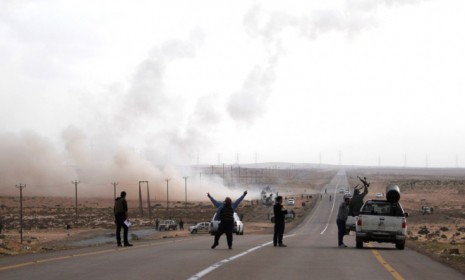Will heavier airstrikes turn the tide in Libya?
NATO is escalating its campaign against Moammar Gadhafi, in the hope that more air power will push the rebels to victory

A free daily email with the biggest news stories of the day – and the best features from TheWeek.com
You are now subscribed
Your newsletter sign-up was successful
On Tuesday, Tripoli was hit by NATO's heaviest airstrikes yet, as the West stepped up its push to drive Libyan leader Moammar Gadhafi out of power. A day earlier, the Libyan regime said bombings by "colonialist crusaders" had killed 19 people at Gadhafi's personal compound. French Foreign Minister Alain Juppe said the allied campaign is triggering defections among Gadhafi's forces and helping rebels to expand their reach. Can this escalated offensive finally defeat Gadhafi? (Watch a PBS report about the air strikes.)
Gadhafi won't last long now: British pilots flying daily combat missions believe the despot is on his heels, says Con Coughlin at Britain's Telegraph. The latest bombing raids, which blasted Gadhafi's intelligence headquarters with pinpoint accuracy, will, in the words of one pilot, "have a massive psychological impact on Gaddafi's regime and his ability to continue terrorizing his own people." It looks like the end of Gadhafi's "odious regime" is near.
"The RAF are doing a sterling job in the war against Gadhafi"
The Week
Escape your echo chamber. Get the facts behind the news, plus analysis from multiple perspectives.

Sign up for The Week's Free Newsletters
From our morning news briefing to a weekly Good News Newsletter, get the best of The Week delivered directly to your inbox.
From our morning news briefing to a weekly Good News Newsletter, get the best of The Week delivered directly to your inbox.
The war is not going to end quickly: The escalation is a sign that the U.S., France, and Britain are worried that the war will drag on too long, says David Brunnstrom at Reuters. France has even decided to put its airmen into the thick of the fight by deploying attack helicopters to blast Gadhafi's forces up close — and Britain might soon do the same. A couple dozen helicopters will certainly "ratchet up the pressure on Gadhafi, and give psychological boost to the rebels," but it might not be enough to tip the balance quickly.
"Analysis: Libya escalation may not tip balance quickly"
More airstrikes make the war more deadly for everyone: "The decision to deploy attack helicopters was a long time in coming," says David Axe at Wired. These flying gunships have proved their value in Afghanistan and Iraq. But the U.S. has lost scores of them to crashes and enemy fire since 2001, and they could be as vulnerable to ground forces as ground forces are to them. "The two-month-old civil war in Libya is about to get a lot deadlier, for both sides."
"Attack helos in Libya mean deadly days ahead — for everyone"
A free daily email with the biggest news stories of the day – and the best features from TheWeek.com
-
 ‘Those rights don’t exist to protect criminals’
‘Those rights don’t exist to protect criminals’Instant Opinion Opinion, comment and editorials of the day
-
 Key Bangladesh election returns old guard to power
Key Bangladesh election returns old guard to powerSpeed Read The Bangladesh Nationalist Party claimed a decisive victory
-
 Judge blocks Hegseth from punishing Kelly over video
Judge blocks Hegseth from punishing Kelly over videoSpeed Read Defense Secretary Pete Hegseth pushed for the senator to be demoted over a video in which he reminds military officials they should refuse illegal orders